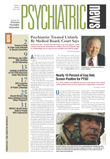Thanks to a grant from the John A. Hartford Foundation, a group of psychiatrists and primary care physicians came together in 1999 to develop a new model for treating depressed older Americans. They named the model“ IMPACT” (“Improving Mood Promoting Access to Collaborative Care Treatment”).
In essence, IMPACT would place a depression care manager (usually a nurse) in a primary care clinic to assist primary care physicians in the care of older depressed patients. The manager would work with the physicians to establish depression treatment plans for the patients. In addition, the manager would contact the patients every other week to see how they were doing. If they recovered from depression, a relapse-prevention plan would be put into effect, and the manager would follow them over the next few months to determine how well the plan was working. If they did not recover from depression, the manager would discuss their case with a consulting psychiatrist, and treatment would be adjusted accordingly.
Also in 1999, with funding from the John A. Hartford Foundation, California Healthcare Foundation, Hogg Foundation, and Robert Wood Johnson Foundation, a large clinical trial to assess the clinical effectiveness of the IMPACT model was launched. It included some 1,800 depressed adults aged 60 and over and took place in 18 primary care clinics in five states. Subjects were then randomized to receive either IMPACT care or “care as usual.”
One-year treatment results from the trial, which became available in late 2002 and early 2003, were quite positive (Psychiatric News, January 17 and April 4, 2003). Forty-five percent of the IMPACT subjects had a 50 percent or greater reduction in depressive symptoms by the end of the study, compared with only 19 percent of the usual-care subjects—a highly significant difference. IMPACT subjects also reported more satisfaction with depression care, less functional impairment, and greater quality of life than did controls.
Two-year follow-up results from the trial, which appeared in the February 4 British Medical Journal, are even more encouraging. Subjects who had received IMPACT treatment for a year were found to fare significantly better two years after treatment ended than subjects who had gotten usual care for a year.
Specifically, the IMPACT group did better concerning continuation of antidepressant treatment, depression remission, physical functioning, quality of life, and satisfaction with depression care. Even more impressive, these positive results applied to both men and women subjects, to subjects from various ethnic backgrounds, to subjects of various ages, and to subjects who had medical conditions as well as depression.
Thus, “tailored collaborative care actively engages people [aged 60 and over] in depression treatment and delivers important benefits that persist at least one year after the completion of the intervention program,” the researchers concluded in their study report.
Two of the principal investigators were Jurgen Unutzer, M.D., and Wayne Katon, M.D., both vice chairs of psychiatry at the University of Washington. In fact, it was Unutzer who oversaw efforts to develop the IMPACT model back in 1999.
Moreover, Unutzer and Katon are working hard to get the IMPACT model established in real-world health care settings, they told Psychiatric News. During the past two years, they have trained more than 500 clinicians from some 50 organizations in the model. During the past year, Kaiser Permanente of Southern California has made the model available to its 3 million members. Indeed, along with Sutter Health and Duke University, Kaiser Permanente is using the model to treat depressed patients of all ages.
Getting the model incorporated into various health care settings isn't easy, Katon and Unutzer concurred. As they wrote in the December 2005 Psychiatric Clinics of North America, “It is not clear whose job it is in the medico-academic industrial complex to disseminate evidence-based practices and whose job it is in the real world of health care delivery to adopt proven innovations....”
Katon told Psychiatric News, “The biggest hurdles are organizational barriers and economic barriers to change.” Nonetheless, he continued, “Some of the proposed changes like pay-for-performance insurance that pays for improving patient outcomes may help.” Also, Unutzer stressed, “We are only in the second year of a five-year grant from the John A. Hartford Foundation to get the model implemented in real-world practice.”
Thus, the model will undoubtedly be disseminated further during the next five to 10 years, he anticipates—say, in major health care organizations like Kaiser Permanente.
BMJ 2005 7536 259
